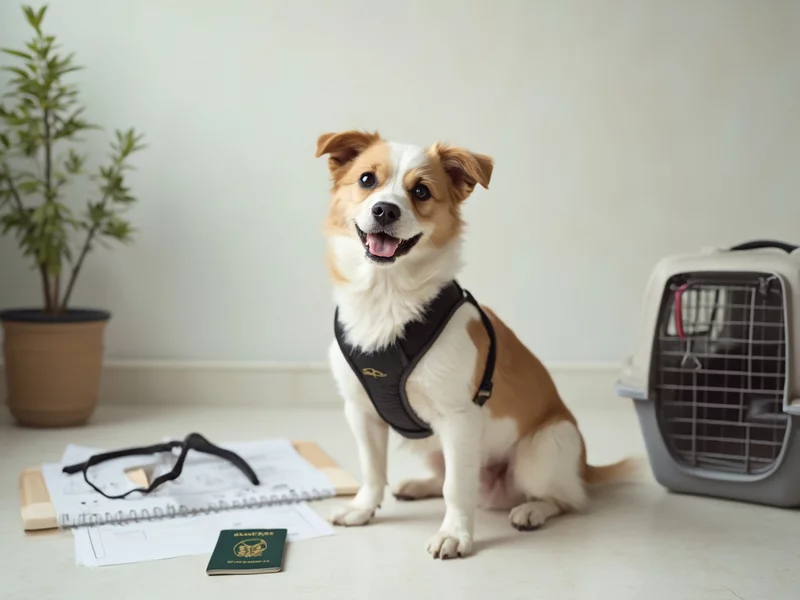Preparing Pet Vaccinations for Travel

Traveling with your pet to Australia requires careful planning and adherence to specific vaccination requirements. Are you ready to ensure a smooth journey for your furry friend? Here’s what you’ll need to know.
What You Will Learn
- Key vaccinations include Rabies, Distemper, Parvovirus, and Hepatitis—ensure these are completed at least 21 days before travel.
- An import permit and a veterinary health certificate are mandatory for bringing pets into Australia.
- Microchipping your pet is essential and must be done before vaccinations for accurate identification.
- Understand the import regulations based on your country’s rabies risk classification to prepare accordingly.
- Begin your travel preparations early to manage vaccinations and paperwork without stress.
Pet Travel to Australia: Key Requirements and Process Flow
Understanding the essential vaccinations and the overall import process is vital for ensuring a smooth journey for your pet into Australia.
Pet Import Process Steps
- Obtain import permit
- Veterinary health certificate
- Microchipping
- Pre-export inspection
Country Risk Classification
- Group 1: Low rabies risk (fewer restrictions)
- Group 2: Moderate rabies risk (additional tests)
- Group 3: High rabies risk (stringent regulations)
Key Takeaways for Pet Travel Planning
Understanding Pet Vaccination Requirements for Travel to Australia
Traveling with your furry companion to Australia is an exciting adventure, but it comes with its own set of vaccination requirements. It's essential to ensure your pet is protected and meets all regulations before making the journey. In this section, we’ll explore the key vaccinations needed and the overall import process to ensure a smooth transition for your pet.
Key Vaccinations Needed for Your Pet
Before traveling to Australia, your pet must receive specific vaccinations to comply with Australian regulations. The most crucial vaccinations include:
- Rabies: This vaccine is vital as Australia is rabies-free. Your pet must be vaccinated at least 21 days before entry.
- Distemper: A common viral infection that can be severe; ensure your pet is vaccinated well in advance.
- Parvovirus: Another essential vaccine to help prevent this highly contagious disease.
- Hepatitis: Protects against infectious canine hepatitis, which can affect the liver.
It’s important to stay updated on any recent changes to these requirements. Always consult with your veterinarian to ensure your pet’s vaccinations are current and to receive any additional recommendations specific to your pet's health needs.
Overview of Pet Import Process to Australia
Preparing for your pet's arrival in Australia involves several steps. Here’s a quick guide to the import process, which is detailed by official sources like the USDA Animal and Plant Health Inspection Service (APHIS):
- Obtain an import permit: This document is mandatory for bringing pets into Australia.
- Get a veterinary health certificate: It must confirm that your pet is healthy and free from diseases.
- Microchipping: Your pet must be microchipped before vaccinations are administered to ensure accurate identification.
- Pre-export inspection: Conducted by your veterinarian to verify that your pet meets all health and vaccination requirements.
Being diligent in following these steps will help you avoid any last-minute surprises and ensure your pet's safe entry into Australia. Remember, it's all about providing your furry friend with the best care throughout the journey!
Country-Specific Regulations on Pet Travel
Different countries have varying regulations concerning pet travel, categorized into groups. Understanding these groups can significantly aid in your preparation, as highlighted by resources such as the CDC's guidelines for importing dogs from high-risk countries:
- Group 1: Countries with low rabies risk; pets from these regions have fewer restrictions.
- Group 2: Countries with a moderate rabies risk; pets may require additional vaccinations and testing.
- Group 3: Countries with high rabies risk; pets usually face stringent regulations and testing.
Australia's strict regulations aim to maintain its rabies-free status, so it’s crucial to understand how your home country's classification affects your pet's travel plans. Do your research ahead of time, and always check for any updates through reliable resources or your vet! The AVMA also offers FAQs for veterinarians on CDC dog importation requirements, which can be useful for understanding specific health protocols.
Pro Tip
To avoid any last-minute surprises, consider scheduling your pet's vaccinations and health checks at least a few months before your planned travel date. This allows ample time for any required vaccinations to take effect, especially the rabies vaccine, which must be administered at least 21 days prior to arrival in Australia. Additionally, keep all documentation organized in one place to streamline the import process!
Frequently Asked Questions (FAQs) About Pet Travel to Australia
Summarizing Your Pet’s Travel Vaccination Journey
As we wrap up our discussion on preparing your furry friend for travel to Australia, let's highlight the key steps and considerations that every pet owner should keep in mind. First and foremost, ensuring your pet is up-to-date on all necessary vaccinations, like Rabies and Distemper, is crucial for compliance with Australian regulations.
Additionally, having all documentation ready, such as health certificates and import permits, will streamline the import process. Consider this a bonding experience with your pet, as you prepare them for a new adventure together!
Bringing It All Together: Key Takeaways
- Confirm your pet’s vaccination status and schedule any necessary immunizations.
- Gather required documents, including health certificates and import permits.
- Understand the specific regulations based on your country of origin.
- Prepare your pet for travel through stress-minimizing techniques and comfort items.
- Stay informed about airline policies regarding pet travel.
Remember, your pet's health and well-being should always be the priority. By following these steps, you're setting the stage for a safe and smooth travel experience.
Encouragement to Start Planning Early
As an advocate for pet wellness, I can't stress enough how important it is to start planning your pet’s travel preparations as early as possible! This gives you ample time to address any health concerns, schedule vaccinations, and compile the necessary documents. Rushing at the last minute can be stressful for both you and your pet.
By starting early, you’ll not only ensure everything is in order, but you’ll also enjoy the process of preparing your beloved companion for this exciting journey!
Next Steps for Pet Owners
Resources for Further Information
For those seeking up-to-date information on travel requirements and regulations, there are several official websites that can provide valuable insights. I recommend visiting:
- Australian Government Department of Agriculture, Water and the Environment (DAWE)
- Department of Agriculture, Fisheries and Forestry (DAFF)
- USDA Animal and Plant Health Inspection Service (APHIS)
These resources are fantastic for keeping up with any changes in pet travel policies and ensuring you’re fully prepared.
Call to Action: Ensure Your Pet is Ready for Travel
Now that you have all this information, I’d love to hear from you! Have you traveled with your pet to Australia? Or do you have any questions about the process? Join our community of informed pet travelers by sharing your experiences or asking questions. Together, we can ensure that every pet receives the best care and preparation for their travel journey!
Recap of Key Points
Here is a quick recap of the important points discussed in the article:
- Ensure your pet is vaccinated against Rabies, Distemper, Parvovirus, and Hepatitis at least 21 days before travel.
- Obtain an import permit and a veterinary health certificate for your pet.
- Microchip your pet before vaccinations for accurate identification.
- Understand your home country's rabies risk classification and its impact on travel regulations.
- Start planning early to avoid last-minute stress and ensure all preparations are complete.
Popular Posts
 Understanding the Importance of Puppy Care
As a new puppy parent, ensuring your furry friend receiv
Understanding the Importance of Puppy Care
As a new puppy parent, ensuring your furry friend receiv
 As pet owners, understanding the financial implications of emergency vet visits is crucial for ensur
As pet owners, understanding the financial implications of emergency vet visits is crucial for ensur
 The journey towards a healthier pet can start with a simple question: Are you ready to consider a ho
The journey towards a healthier pet can start with a simple question: Are you ready to consider a ho
 ##
Have you ever considered the significant impact that vaccinations have not just on your dog, but
##
Have you ever considered the significant impact that vaccinations have not just on your dog, but
